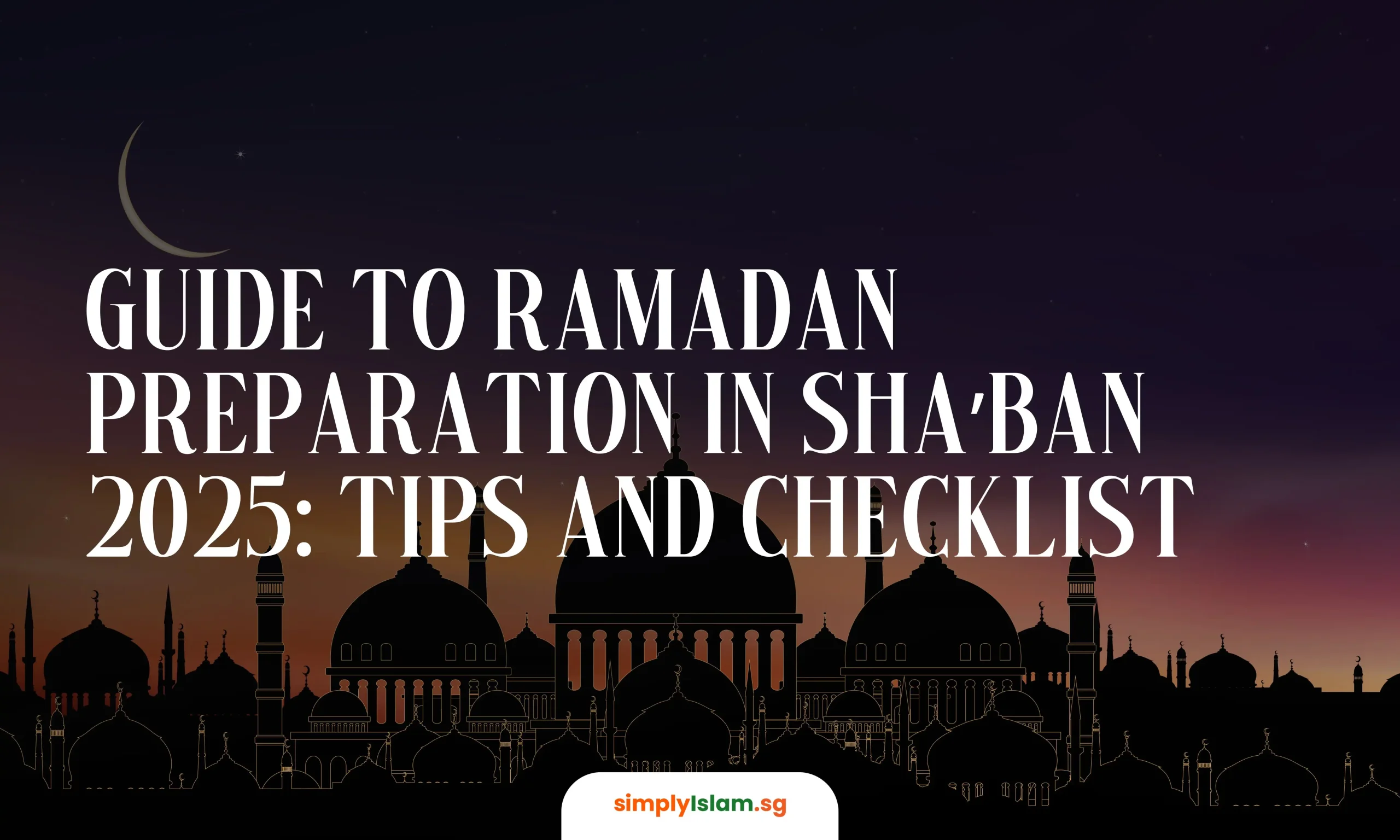

Alhamdulillah, Ramadan is almost approaching soon and this is your chance to improve yourself as a better Muslim! One of the best ways to do that is none other than following the footsteps of our beloved Prophet Muhammad, Peace and Blessings be upon him. By following the Sunnah, it proves our love not only for our Prophet ﷺ but also, it draws us closer to Allah Almighty, InshaAllah.
قُلْ إِن كُنتُمْ تُحِبُّونَ ٱللَّهَ فَٱتَّبِعُونِى يُحْبِبْكُمُ ٱللَّهُ وَيَغْفِرْ لَكُمْ ذُنُوبَكُمْ ۗ وَٱللَّهُ غَفُورٌ رَّحِيمٌ
“Say, ˹O Prophet,˺ “If you ˹sincerely˺ love Allah, then follow me; Allah will love you and forgive your sins. For Allah is All-Forgiving, Most Merciful.” [Qur’an 3:31]
Every Muslim should revive the Sunnah of the Prophet ﷺ in Ramadan, starting from the first day all the way to the end! With that, would you like to know what kinds of Sunnah you can do during this blessed month of Ramadan?

1. Give Sadaqah to the Needy
Ramadan is the month of giving, and this is one of the Sunnah everyone should try to revive if they have the financial means to do so. The impact sadaqah can make does not only affect the spiritual self, but it affects the society at large, SubhanAllah. Needy families, single mothers, orphans and the homeless will finally have enough to break their fasts in this blessed month if more Muslims are able to revive this Sunnah!
Abu Hurairah (May Allah be pleased with him) reported:
The Messenger of Allah (ﷺ) said, “When a man dies, his deeds come to an end except for three things: Sadaqah Jariyah (ceaseless charity); a knowledge which is beneficial, or a virtuous descendant who prays for him (for the deceased).” [Muslim]
If you are interested to join in bringing this Sunnah back to life, you can do so by supporting charities at your local mosques nearby or online! If you’re in Singapore and would like to help provide financial aid and feed over 400 needy families, this is your chance to do so. Don’t delay in charity, as it stands in the way of calamity!

2. Treat Your Parents Well
Obviously, Ramadan is no exception! We should always be kind to our parents and treat them with respect and compassion. It is one of the Sunnahs that we almost often overlook, but this is the time for us to make amends with our parents and help them out whenever they need.
Ibn Mas’ud (May Allah be pleased with him) reported:
I asked the Messenger of Allah (ﷺ): “Which action is dearest to Allah?” He (ﷺ) replied, “Performing As-Salat (the prayer) at its earliest fixed time.” I asked, “What is next (in goodness)?” He (ﷺ) said, “Kindness towards parents.” I asked, “What is next (in goodness)?” He (ﷺ) said, “To participate in Jihad in the Cause of Allah.” [Al-Bukhari and Muslim]
If you live in the same home with your parents, try offering some help by doing house chores, preparing meals for Iftar, keeping them company and the list goes on and on! However, if you’re far away from home, try to call them up once in a while and ask how they are doing. InshaAllah, a simple gesture like that will definitely help them feel better.
3. Don’t Miss Your Suhoor
Your health matters and that’s what the Sunnah is implying! Our beloved Prophet ﷺ encourages us to fill our stomachs whenever we have the chance, before Fajr and right after Maghrib. This is to avoid ourselves from starving too much, having to endure the day without sufficient supply of energy.
It was narrated from Abu Hurairah that the Prophet ﷺ said:
“Take Sahur, for in Sahur there is blessing.” [Sunan An-Nasa’i]
If it’s too difficult for you to wake up early before Fajr, try to ask your friends or families who live with you to wake you up. If you’re living alone, you can always install these effective alarm clock applications to ensure your eyes are wide open, InshaAllah:
Alarm Clock for Heavy Sleepers

4. Standing in Prayer at Night
Either if it is Taraweeh or Qiyamullail, our beloved Prophet ﷺ motivates us to perform Sunnah prayers during Ramadan to increase our Taqwa towards Allah Almighty, focus on the Hereafter and look forward towards the bountiful rewards of performing these acts of worship, SubhanAllah.
Abu Hurairah narrated that The Messenger of Allah (ﷺ) said:
“Whoever prays during the night in Ramadan out of sincere faith and seeking its reward from Allah, will have all of his previous sins forgiven.” [Bulugh al-Maram]
If only you knew the merits of standing in prayer at night, you wouldn’t miss a single night performing Sunnah prayers! While we are still living and breathing, let’s take the time to maximise our capacity of ‘Ibadah and make the most of it, InshaAllah.
5. Practice Patience Whenever You Can
As the old saying goes, patience is a virtue and that goes the same during Ramadan. It is simply a month to observe our patience, not only in fasting but also in managing our emotions effectively and resisting temptations of the Dunya.
Yahya related to me from Malik from Abu’z Zinad from al-A’raj from Abu Hurayra that the Messenger of Allah ﷺ said,
“Fasting is a protection for you, so when you are fasting, do not behave obscenely or foolishly, and if any one argues with you or abuses you, say, ‘I am fasting. I am fasting.'” [Muwatta’ Malik]
If someone ever comes to you and decides to get on your nerves during this Holy Month, do know that the merit of patience is immense. By the way, you don’t want to drain too much of your energy, channeling it in a negative way. Always put your energy to good use to help others and perform good deeds!
If it helps, you can download some of these journaling applications to jot down your thoughts if you’re experiencing emotional turbulence. May Allah Almighty grant you the strength to endure such hardships:

6. Rush and Don’t Delay for Iftar
No! You’re not supposed to eat sloppily and rush the eating process. What we mean by rushing for Iftar is to hasten in breaking your fast. Break your fast the moment you hear the call to prayer, and eat in a proper manner.
Narrated Sahl bin Sa`d:
Allah’s Messenger (ﷺ) said, “The people will remain on the right path as long as they hasten the breaking of the fast.” [Sahih Al-Bukhari]
Recite your BasmAllah, eat together with your family and friends, and break your fast with a date as how the Prophet ﷺ used to do. You can always eat a full course meal if you’re really starving, but it is recommended that you break your fast with a light snack, then pray Maghrib, and continue with a heavier meal afterwards.

7. Make the Most in the Last 10 Nights of Laylatul Qadr
As we all are well aware, the last ten nights during Ramadan are of extreme importance as Laylatul Qadr lies in one of the odd nights. If you are found to be worshiping and dedicating your time during that specific period, it is better than a thousand months, SubhanAllah! The thing is, we never know when the time of Laylatul Qadr would be, so that is why Muslims are encouraged to maximise the quality and quantity of their Ibadah in the last 10 nights!
Narrated Ibn `Umar:
Some men amongst the companions of the Prophet (ﷺ) were shown in their dreams that the night of Qadr was in the last seven nights of Ramadan. Allah’s Messenger (ﷺ) said, “It seems that all your dreams agree that (the Night of Qadr) is in the last seven nights, and whoever wants to search for it (i.e. the Night of Qadr) should search in the last seven (nights of Ramadan). [Sahih al-Bukhari]

8. Recite the Qur’an and Understand its Meanings
“Verily the one who recites the Quran beautifully, smoothly, and precisely, he will be in the company of the noble and obedient angels. And as for the one who recites with difficulty, stammering or stumbling through its verses, then he will have TWICE that reward.” [Sahih Al-Bukhari]
Are you the kind of person who rushes through the 30 days of Ramadan trying to complete your Quranic recitation without contemplating on the hidden gems? You start to lose your voice reciting all night and day, tiring yourself out without actually nurturing your soul.
Stop doing this and start strategising your way to complete the 30 juz of Quran whilst appreciating and reflecting on its valuable message. You can either join a community to recite the Quran together or learn how to recite the Quran from scratch by participating in Quranic courses for beginners!
9. Wetten Your Tongue with Essential Adhkar
One of the easiest forms of worship and most highly rewarding acts you can perform is to engage in the remembrance of Allah Almighty. There are many essential adhkar for you to recite on a daily basis and each of them has its own merits, SubhanAllah. Despite the effortlessness, as long as you truly indulge in the meaning of the dhikr you’re reciting and be mindful of it, InshaAllah, you are on the right path.
Abu Ad-Darda [may Allah be pleased with him] narrated that :
The Prophet ﷺ said: “Should I not inform you of the best of your deed, and the purest of them with your Master, and the highest of them in your ranks, and what is better for you than spending gold and silver, and better for you than meeting your enemy and striking their necks, and they strike your necks?” They said: “Of course.” He said, “The remembrance of Allah [Most High].” [Then] Mu’adh bin Jabal [may Allah be pleased with him] said: “There is nothing that brings more salvation from the punishment of Allah than the remembrance of Allah.” [Jami’ At-Tirmidhi]
10. Perform I’tikaf in the Final 10 Days of Ramadan
First of all, what is I’tikaf? It is the act of a person sitting in isolation in a Masjid or at home with the intention of solely dedicating time to worship of Allah Almighty. It is actually one of the Sunnahs of our beloved Prophet ﷺ that he performed in the last 10 days of Ramadan, or more specifically, during Laylatul Qadr.
‘A’isha (Allah be pleased with her) reported that when the last ten nights began Allah’s Messenger (ﷺ) kept awake at night (for prayer and devotion), wakened his family, and prepared himself to observe prayer (with more vigour). [Sahih Muslim]
Not only did the Prophet ﷺ isolated himself alone, but he also encouraged his family to wake up at night and put the extra effort to worship Allah Almighty through prayer, remembrance of Allah, and spend as little time tending to daily necessities and vain talk as much as possible.
As a conclusion, here are all the 10 Sunnahs you can begin and follow from the first day of Ramadan all the way to the end, InshaAllah. Remember, you don’t have to engage in every single one of these Sunnahs in one go! You can start small and gradually increase in quantity and quality. After all, Allah Almighty loves those who perform their ‘Ibadah consistently and gradually, no matter how small!
May Allah Almighty bless you during Ramadan and may we be able to utilise as much of our time on the Holy Month in His Servitude, InshaAllah. Happy fasting, and Salaam Ramadan!







